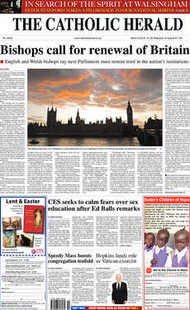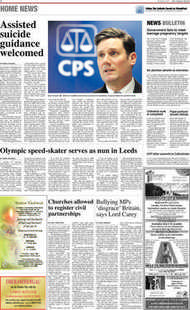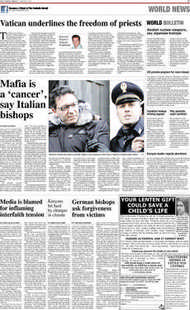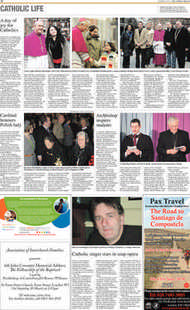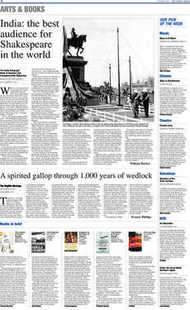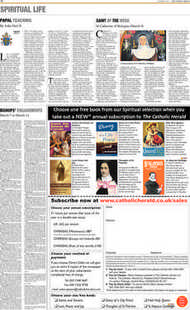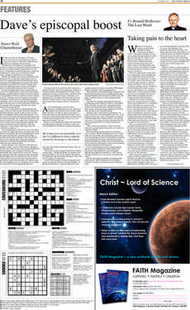Page 15, 5th March 2010
Page 15

Report an error
Noticed an error on this page?If you've noticed an error in this article please click here to report it.
Tags
Share
Related articles
Men With Savage Hearts
The Nazi War Effort Was Undone By Incompetence
Korea Revisited: When The West Fought The East
Charterhouse Chronicle
Mass For Sir Max Pemberton Requiem Mass Was Offered On
A warrior to the core
Finest Years
BY MAX HASTINGS HARPER PRESS, £25
Sir Max Hastings, eminent military historian and war journalist, has subtitled this fat volume, Churchill as Warlord 19401945. It is a subject he knows well.
Readers may groan at the thought of more Churchilliana. I dissent. Hastings is not providing new material here, or a revision of the revision. Bringing together the wealth of his research in his other studies of the period, he provides an intimate and deeply affectionate – but not adulatory – portrait. We of this generation are fortunate not to have lived through a world war. Indeed, because of the memory of it there is a profound and healthy wish for permanent peace. But in 1939 peace at any price was not an option and we should be grateful that a man emerged who understood this and whose supreme gifts of oratory articulated the deepest and best thoughts of his fellow countrymen.
Hastings begins by describing Churchill as “the greatest Englishman and one of the greatest human beings of the 20th century, indeed of all time”.
He accepts that Churchill was “a warrior to the roots of his soul”, instinctively on the attack and not an appeaser. The appeasers of the period, principally Chamberlain and Halifax, do not come out well, but Hastings is fair to them; after the horrors of the Great War it was natural for men to flinch from a second. But Churchill saw that Hitler was evil, that he must be opposed, and that nothing must come in the way of this fight to the death. When on July 19 1940 Hitler publicly offered Britain a choice between peace and “unending suffering and misery”, Churchill responded with inimitable panache: “I don’t propose to say anything in reply to Herr Hitler’s speech, not being on speaking terms with him.” There are many similar ripostes, examples of wit and legendary anecdotes which have been wellrehearsed and circulated.
Hastings includes them, alongside his hero’s flaws, as a contrast to the other leaders who dominated the world scene: Stalin, Hitler and Roosevelt.
Enough ink has been spilled on explaining the warped and hideous psychology of the first two.
Roosevelt, although a great democrat and president was, in Hastings’ esti mation, also a cold fish; cautious, aloof, reluctant to engage in the combat, superficially a man of great charm but entirely lacking the warmth and humanity of the English prime minister.
Churchill had Roosevelt’s measure; Hastings believes it is to his great credit that he patiently continued to woo the president, despite rebuffs, knowing that without US help Britain could not possibly defeat Hitler.
In this he prepared the ground well before the attack on Pearl Harbour and ensured America’s engagement in Europe as well as the Far East.
Hastings is a clear and powerful prose writer; his account of the fortunes of the Front is gripping and measured, even if he has a small (though understandable) weakness for superlatives. Interspersed with the sheer logistics of a world war are shrewd, incisive pen portraits of some of the principal players, such as Beaverbrook, Wavell, Brooke, Bevin and Attlee.
Churchill had to contend with the knowledge that too many of the Army’s senior officers were “agreeable men who lacked the killer instinct for victory”. Nor were the Tommies a fighting machine equal to the Germans. Montgomery was the first commander, despite his overweening vanity, to display the necessary steel. Attlee was consistently loyal, Bevin had vision, Aneurin Bevan was churlish, constantly sniping at the PM in the Commons.
Churchill did not find Sir Alan Brooke, CIGS, congenial. This was reciprocated, but both men respected each other and made victory their common cause. Brooke saw that his boss’s genius for war “was flawed by an enthusiasm for dashes, raids, skirmishes, diversions, more appropriate to a Victorian cavalry subaltern than to the director of a vast, industrial war effort”. There was bungling in the Aegean and more bungling with the operations of the SOE. Dowding, the Air Chief Marshall, rightly commented, we “made fewer blunders than the other side, which is how all battles are won”.
Hastings rightly emphasises the importance of Churchill’s speeches, a unique combination of simplicity of purpose allied to grandeur of expression, and their impact on the listening world. Churchill, a man deeply confident of his destiny to lead his country, believed passionately in “this long island story”.
His love affair with Great Britain, its history and traditions, made his listeners, for a brief period, believe in it too.
blog comments powered by Disqus


